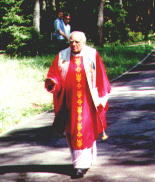|
Katyn priest Monsignor Peszkowski dies at 89 By Robert Strybel, "The Polish Answer Man" By Robert Strybel, Our Warsaw Correspondent WARSAW Monsignor Zdzislaw Peszkowski, one of the last survivors of Stalins Katyn atrocity, passed away at the cardiology clinic in the Warsaw suburb of Anin on the morning of October 8th. Following an eventful, varied and oft-dramatic life, the World War II cavalryman, post-war priest, Polonian educator and Katyn crusader, who had long been treated for a heart condition, finally succumbed to the disease at the age of 89. A Polish cavalryman during the dual Nazi-Soviet invasion of Poland in September 1939, he was captured by the Soviets and sent to the Kozielsk prisoner-of-war camp near Smolensk, Russia with some 5,000 other Polish officers. All but a handful were murdered by the NKVD with a bullet to the back of the head and buried in common graves in nearby Katyn Forest. Katyn has become the code-name for Stalins cold-blooded annihilation of some 22,000 Polish officers, civil servants, priests, teachers, lawyers and others, whose leadership potential was feared by the Kremlin. At one point, some 200 Kozielsk prisoners were unexpectedly ordered to pack up their meager belongings and were moved to another detention site. After being spared, Peszkowski believed it was his duty to bear witness to a truth that would be repressed for half a century. The Russians stubbornly insisted that the Germans had committed the crime. After Hitlers attack on the Soviet Union in 1941, the Russians agreed to the formation of a Polish army in the USSR. In the ranks of General Wladyslaw Anders Second Corps, Sergeant Peszkowski crossed over into Persia and spent several years caring for Polish orphans in Iraq, Pakistan and India, where he also served as a scout leader. After studying for a year at Englands Oxford University, Peszkowski felt a calling to the priesthood and was encouraged by a bishop to enroll in the Polish Seminary at Orchard Lake, Michigan. He would spend the better part of the next four decades at that leafy lakeside campus, a repository of Polish culture which visiting Krakow Archbishop Karol Wojtyla (the future Pope John Paul II) once called serce Polonii (the heart of Polonia). After being ordained to the priesthood in 1954, Peszkowski taught Polish language and literature as well as pastoral theology at Polonias Orchard Lake Schools. But he never forgot his heart-felt commitment to uncovering and spreading the full truth about the Katyn massacre. In January 2006, the Sejm (Poland's lower house of parliament) voted by acclamation to nominate Monsignor Zdzislaw Peszkowski as Polands Nobel Peace Prize candidate. According to the Sejm resolution, Monsignor Peszkowski has for years conducted a fruitful campaign in the international forum to preserve the memory and make international public opinion aware of the Katyn crime, an unprecedented massacre committed by the Soviet Union on interned Polish officers. At the same time, the Monsignor, a Soviet-held prisoner and surviving Katyn victim, has for years acted in the spirit of forgiveness and Polish-Russian reconciliation. At the time of the nomination, Peszkowski told this reporter: I was both surprised and moved at the Sejms nomination, but I view it mainly as a tribute to those murdered at the Golgotha of the East by the ideology of evil and hatred. Perhaps the time has come for the world to finally come to grips with Soviet atrocities and pay tribute to their victims the way it has with regards to the Nazi Holocaust. After retiring from his Orchard Lake professorship, Peszkowski returned to Poland in 1990 and devoted the rest of his life to seeing justice done to the memory of his slain comrades-at-arms and their families. As chaplain of the Federation of Katyn Families, Monsignor Peszkowski sought, as he put it, Polish-Russian reconciliation on the basis of truth, memory, law and forgiveness. He took his case to Boris Yelstin at the Kremlin and worked tirelessly to commemorate victims of Stalinist genocide through the creation of war cemeteries at the three main massacre sites. He wrote books on the subject and was involved in efforts to memorialize Katyn victims through monuments, symposia and other public undertakings. A close friend of the late Polish-born Pontiff John Paul II, he was at his side during papal pilgrimages to Poland and America and countless visits to the Vatican. Without our beloved Holy Father I would have never accomplished what I have. It was he who inspired and encouraged me. Whenever he saw me, in his first words he would assure me of his daily prayers for Katyn victims and their families and he would urge me on saying: Keep searching for the truth and remember that the power of truth is in forgiveness and reconciliation. I first met Father Peszkowski in the early 1960s, when we were both studying under the same Polish literature specialist, Professor Edmund Zawacki at the University of Wisconsin. Little did I imagine that a few years later we would become colleagues at Polonias Orchard Lake Schools, where I held my first teaching job as Polish language instructor and history lecturer. Let alone that that would lead to a friendship spanning more than four decades. The warm, dedicated, charismatic and infectiously optimistic Monsignor Peszkowski will be missed by many friends across Poland and Polonia, the descendants of the Katyn victims whom he worked so hard to identify and memorialize. And he will also be fondly remembered by several generations of Polish-American priests and lay activists whom he taught at Orchard Lake, instilling in them his deep-seated devotion to our Polish-American and Catholic heritage. Wieczne odpoczywanie racz Mu dac, Panie |
